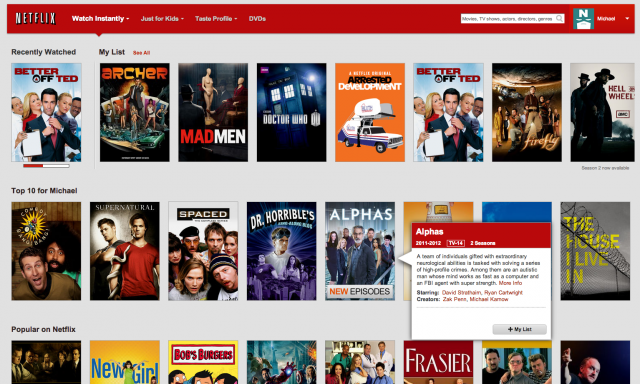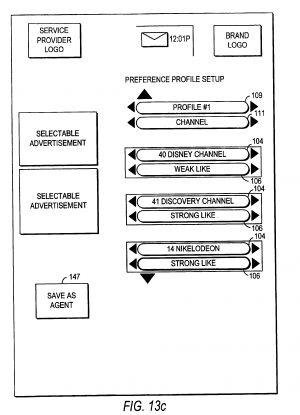
One of the businesses of the multifaceted Rovi Corporation is the creation of "interactive program guides," like the ones you might see on the DVR that comes with your cable or satellite service. Cable companies like Comcast buy Rovi's online guide services.
There are other video-on-demand companies that don't want to use Rovi's guide services, but Rovi wants them to pay up anyway. The company believes the trove of patents it has acquired over the years mean it owns rights to a wide array of what are essentially online television guides. Beginning in 2010, the company started suing TV manufacturers, saying that its program guides infringed on various Rovi patents. Rovi even sued pure software companies. In 2011, it filed a lawsuit against Amazon-owned IMDb and another one against Hulu. Rovi accused Netflix as well, and that dispute was in court by the end of the year.
Rovi is a rare breed: a large operating company that also has an aggressive patent litigation campaign. Last year, Rovi had $651 million in revenue. Because of the way it reports its business segments, it's unclear how much of that comes from patent licenses.
In 2012, Rovi escalated the patent dispute with Netflix by taking the video-on-demand company, along with three TV manufacturers that made Netflix-ready televisions and Roku, to the International Trade Commission. In this space, Rovi said it could ban the importation of defendants' products if it won its patent case.
But wait, you might be thinking—Netflix doesn't actually import anything.
That's what Netflix's lawyers argued, too, but it didn't stop Rovi from pursuing a 17-month ITC case. Now Netflix has finally prevailed; if Rovi had won, it would have been a threat to other domestic software companies.
Turn off Netflix? It’s just entertainment
Rovi's argument was that by giving out its Software Development Kit (or SDK) to various TV companies like LG Electronics, Netflix was inducing infringement of the four Rovi TV guide patents at issue. By licensing out its SDK to TV companies, Netflix was making an infringing "sale," even though the SDK was given out without charge. Rovi asked the commission to issue a novel "cease and desist" order that would have stopped Netflix from giving out its SDK to the TV companies.
And if Netflix lost—and consumers lost access to the service? No big deal, argued Rovi's ITC lawyers. Netflix is, after all, just entertainment. As that company explained in one filing:
Netflix is primarily in the business of providing entertainment to consumers. That does not implicate public interest concerns that the Commission has previously found warrants the denial of relief, such as healthcare, national defense, or energy.... Consumer demand for video-on-demand services could readily be met by alternative sources such as Best Buy’s CinemaNow service, which is an implementation of the Rovi Entertainment Store platform, and Apple’s video-on-demand services, which utilizes patented Rovi technology.
Netflix, predictably, responded by saying that shutting off its services would be a very big deal. It would be an unprecedented leap, in fact, for a trade commission historically tasked with regulating imported goods. Not only did Rovi have a better place to pursue its patent claims (federal court), but allowing it to move ahead and pursue a "first-of-its-kind" order against a wholly domestic software company would encourage "patent assertion entities," or patent trolls, to keep trying their hand at the ITC. As Netflix's lawyers wrote:
Rovi has spent a decade building a patent portfolio by acquiring companies or buying already filed patents—many of which date to the 1990s when technology was fundamentally different. The result is a portfolio of 1,100 patents and patent applications related to interactive program guides. Rovi has leveraged its huge portfolio to extract license agreements from many high-tech companies throughout the United States. [R]evenue-driven licensing simply extracts money from companies that are already driving trade and innovation. Rovi practices revenue-driven licensing... [which] is also the model used by PAEs to stifle innovation while thriving themselves.

The four patents have disparate origins. Two patents originated with a company called United Video Properties in the 1990s. A third patent was purchased from IBM in 2011. The fourth patent, which was invalidated, was issued in 2012 but claims priority back to 1995. It originates with StarSight Telecast.
Netflix didn't respond to a request for comment about the case.
A Rovi spokesperson emphasized that the ITC case's outcome hinged on the "limited functionality of the Netflix app at the time it is imported into the US." In federal court, importation won't be an issue at all, and Rovi now expects a "favorable outcome" there. "In the US District Court, where our case continues, we believe infringement will be based on Netflix’s entire service offering and the full-functionality that is added after devices are imported and the service activated," the company said via e-mail.
TV companies including LG Electronics, Vizio, and Mitsubishi have all reached patent settlements with Rovi. Hulu settled earlier this year. Court records show that Rovi lost its case against Amazon/IMDB due to an unfavorable claim construction ruling, but that case is now on appeal.
reader comments
59